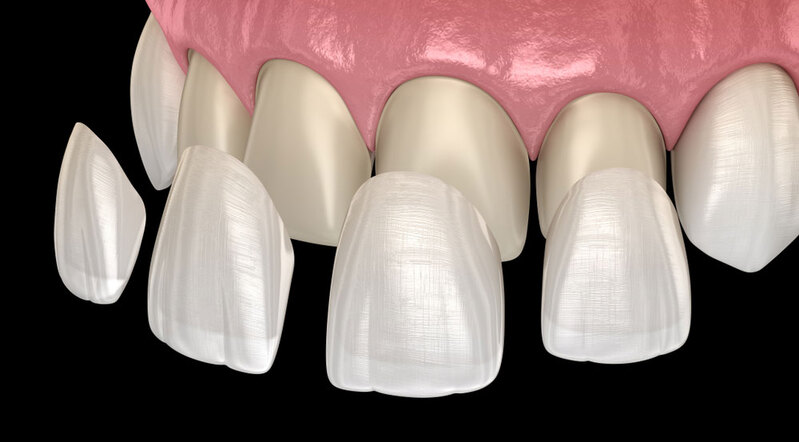
At Advanced Dentistry of Kearney, Dr. Stacy Reece offers both composite and porcelain veneers to transform your smile. Composite veneers are made of resin and are shaped and bonded to a tooth. Porcelain veneers are made in a lab and are bonded to a tooth. Porcelain veneers are more resistant to staining than composite veneers.
Dr. Reece can shape or color veneers however you want to provide you with the results you desire.
During your first consultation, Dr. Reece will discuss veneers with you and give you an opportunity to ask questions. She will also take x-rays and an impression of your teeth to make sure they are healthy and free of tooth decay. If she discovers any dental issues, she will need to treat your teeth before preparing your teeth for veneers.
If you choose composite veneers, these can be applied in one visit. If you choose porcelain veneers, it will take 2 to 3 visits to complete your smile makeover.
For both composite and porcelain veneers, Dr. Reece will need to prep your teeth, removing a thin layer of your enamel to make room for the veneers.
Removing a thin layer of enamel is not harmful to your teeth (note that enamel does not grow back). Composite veneers are then bonded to your teeth with special cement. The bonding material is safe and does not harm your teeth. It adds an extra layer of protection to your teeth.

For porcelain veneers, after Dr. Reece preps your teeth, she’ll take an impression of your teeth to send to a dental lab to make your permanent veneers. In the interim, temporary veneers are placed on your teeth. At your second appointment, the temporary veneers are removed, and permanent veneers are bonded to your teeth with special cement. The bonding material is safe and does not harm your teeth. It actually adds an extra layer of protection to your teeth and prevents staining.
In most cases, temporary porcelain veneers are placed until your permanent veneers are ready 2-3 weeks after your initial visit.
While you have temporary porcelain veneers, you should avoid eating hard foods such as nuts, apples, tough meats, crusty bread, raw vegetables, candy, and pigmented drinks such as coffee, red wine, colas, and teas.
Permanent veneers are made from high-grade porcelain made to last. With porcelain veneers, you don’t have as many restrictions with food and drinks, as permanent veneers aren’t easily damaged, and they resist stains quite well. However, since they are not indestructible, care needs to be taken to avoid certain habits and limit your intake of certain foods and drinks that could damage them, such as
If you have your natural teeth and want to improve your smile cosmetically, veneers may be the right choice for you, especially if
The price of veneers depends not only on the type you choose and where you live, but also on the right dental expert performing the treatment. Composite veneers are less expensive than porcelain veneers.
There are several things you can do to help keep your veneers white:
If you are ready to transform your smile with veneers or have any additional questions, please call Advanced Dentistry of Kearney at(308) 237-1311 to schedule your appointment.
Porcelain veneers do not ruin your teeth. They remain safe and protected underneath the veneers.
Porcelain veneers last up to 10 years before you need to replace them with a new set.
The number of veneers you’ll want to get depends on the area you wish to cover. On average, most people get enough to cover the teeth that show when they smile. For some, this may be eight veneers, and for others, it could be 12 veneers.
In prepping the teeth for veneers, a thin layer of enamel is removed, so you need to have enough healthy enamel to tolerate the procedure.
Veneers are permanently bonded to your teeth. If one falls off or chips, you have to replace it.
Since veneers are considered cosmetic dentistry, insurance does not cover the cost. Dental insurance only covers medically necessary expenses.
Yes, teeth can still decay under veneers, which can lead to root canals and crowns over time. Veneers are not indicated for people who have a history of weakened enamel, gum disease, or other dental conditions.
Yes, you should continue to brush and floss your teeth as usual. Keep up with your normal dental hygiene routine and your professional dental hygiene appointments twice yearly.